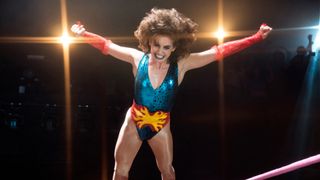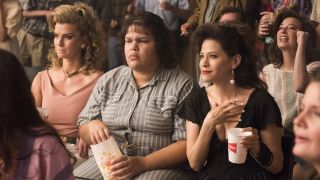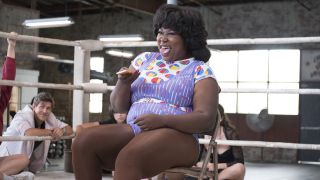Why GLOW is the greatest TV show about wrestling (that’s not really about wrestling)
How Netflix's new show brings subtlety, soul and understanding to the world of sports entertainment

***Contains spoilers for GLOW***
“You’re so real!” This backhanded compliment is grunted to Alison Brie’s Ruth Wilder during life-ruining sex in the first episode of GLOW, a new Netflix show from the creators of Orange is the New Black. The words are deliberately chosen. ‘Real’ is a concept which haunts professional wrestling, the subject of the show: part sport, part performance, part something that’s simultaneously real and not really real at all.
If that sounded complicated, it was meant to. Wrestling is a paradox, at once obvious and mysterious, open with its influences but guarded about its secrets. Thankfully, GLOW does a much better job than I'm doing of explaining these subtleties, and you don’t need to care about wrestling to enjoy it. In fact, you'll probably enjoy it more if you don’t, for reasons I’ll explain below. And, if you love wrestling, it’s nice to see it taken seriously. 'Seriously' might give the wrong impression - this is a comedy, after all - but GLOW does a complimentary job of exploring the conflict and creativity that inspires violent, five-minute stories anyone can understand.
Perhaps the cleverest thing about GLOW is that it’s a metaphor for wrestling itself, with its audience of hopeful dilettantes and informed obsessives. Half the audience boos the bad guy; the other applauds how much heat he’s generating. Some viewers will tune in because they watched wrestling their entire lives, others because they love Orange is the New Black, and there are some people in the centre of that Venn diagram. But GLOW goes deeper. It echoes the journey of the characters, who come to wrestling as outsiders but learn to appreciate the subtleties of the business. As a lapsed wrestling fan, my favourite moments didn’t come from recognising Brodus Clay or seeing a crisply executed sunset flip, but from the casts’ gradual understanding of what wrestling is.

It’s an effective narrative device that does a better job selling the sport than wrestling promotions themselves. WWE calls its flagship show, Monday Night Raw, ‘the longest running weekly episodic television show in history’. GLOW is more honest: Betty Gilpin’s Debbie is watching the main event at a wrestling show when it finally clicks for her. Revenge, romance, estranged siblings: “It’s a soap opera! This whole thing is a soap opera!” The fact her character is a former soap star helps crystallise the analogy. The experience of watching GLOW is the same concept, but flipped. You think you’re watching a comedy show, but it’s secretly also a wrestling storyline, because everything is wrestling. Betrayal, failure, shocking familial revelations - these are sports entertainment tropes in plain clothes. The closing moments of the series tell you this explicitly by leaving the main storyline unfinished. The belt is still on the wrong person. The feuds aren’t resolved.
Betrayal, failure, shocking familial revelations - these are sports entertainment tropes in plain clothes.
And, just like real wrestling, the heart of the show is in the characters, and it’s here where GLOW shows a different kind of understanding. This isn’t a show about the gimmicks - the wrestling pseudonyms adopted to work the crowd - but the people who inhabit them. In real wrestling, gimmicks make or break a career - Steve Austin would have slid into obscurity if they’d called him Chilly McFreeze instead of Stone Cold (that’s not a joke - they almost did). But personas are secondary in GLOW. You still can be invested in match between the all-American Liberty Belle and Soviet heel Zoya the Destroyer precisely because GLOW has shown you how much effort has gone into their creation. The gimmicks don’t matter - the people do.

In that sense, GLOW makes us all smarks - a gently pejorative term for wrestling fans who know the sport is choreographed but appreciate the craft nonetheless. And it’s here that GLOW isn’t satisfied with simple analogy. There are no tired heels and faces in the locker room, because they’re real people. In the beginning, Ruth feels like a hero because she has to suffer through so much, but that sensation doesn’t last long. She’s refreshingly flawed, occasionally irritating, and far too complex for a reductive persona. Every character has nuance, and it’s most obvious with Kia Stevens’s Tammé Dawson. Stevens is an ex-professional wrestler who was booked as a monster heel - a monosyllabic force of nature, crushing everything in her way. Here, as Welfare Queen, she’s given the space to show exactly what she can do, and we get depth, character, reservation and humour. Wrestling’s loss is GLOW’s gain.
Sign up to the SFX Newsletter
Get sneak previews, exclusive competitions and details of special events each month!
Let's finish with a final analogy. When Kia Stevens wrestled a Kharma, it only took a single glance to understand her character. She was a monster. Watch her as Tammé in the show, however, and you get a glimpse of the range wrestling fans were denied. Likewise, you can’t write GLOW off as just a wrestling show. It’s a smart commentary about Hollywood and the jagged, swiftly-shutting window of opportunity it offers women. And it’s a comedy that rations its tender moments, making them all the more effective when they arrive. But most of all, much like the paradox in the intro, it’s the best show about wrestling that actually isn’t about wrestling.
Most Popular





